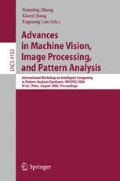Abstract
In this paper we investigate two discriminative classification approaches for frame-based speaker identification and verification, namely Support Vector Machine (SVM) and Sparse Kernel Logistic Regression (SKLR). SVMs have already shown good results in regression and classification in several fields of pattern recognition as well as in continuous speech recognition. While the non-probabilistic output of the SVM has to be translated into conditional probabilities, the SKLR produces the probabilities directly.
In speaker identification and verification experiments both discriminative classification methods outperform the standard Gaussian Mixture Model (GMM) system on the POLYCOST database.
Access this chapter
Tax calculation will be finalised at checkout
Purchases are for personal use only
Preview
Unable to display preview. Download preview PDF.
References
Reynolds, D.: An overview of automatic speaker recognition technology. In: Proc. IEEE International Conference on Acoustics, Speech, and Signal Processing, vol. 4, pp. 4072–4075 (2002)
Krüger, S.E., Schafföner, M., Katz, M., Andelic, E., Wendemuth, A.: Speech recognition with support vector machines in a hybrid system. In: Proc. EuroSpeech, pp. 993–996 (2005)
Jaakkola, T., Haussler, D.: Exploiting generative models in discriminative classifiers. In: Kearns, M., Solla, S., Cohn, D. (eds.) Advances in Neural Information Processing Systems, vol. 11, pp. 487–493. MIT Press, Cambridge (1999)
Wan, V., Renals, S.: Speaker verification using sequence discriminant support vector machines. IEEE Transactions on Speech and Audio Processing 13(2), 203–210 (2005)
Przybocki, M., Martin, A.: NIST speaker recognition evaluation chronicles. In: Proceedings of ODYSSEY - The Speaker and Language Recognition Workshop (2004)
Reynolds, D., Quatieri, T., Dunn, R.: Speaker verification using adapted gaussian mixture models. Digital Signal Processing 10, 19–41 (2000)
Vapnik, V.N.: The Nature of Statistical Learning Theory, 2nd edn. Information Science and Statistics. Springer, Berlin (2000)
Burges, C.: A tutorial on support vector machines for pattern recognition. Data Mining and Knowledge Discovery 2(2), 121–167 (1998)
Platt, J.: Probabilistic outputs for support vector machines and comparisons to regularized likelihood methods. In: Bartlett, P., Schölkopf, B., Schuurmans, D., Smola, A. (eds.) Advances in Large-Margin Classifiers, pp. 61–74. MIT Press, Cambridge (2000), available: http://research.microsoft.com/~jplatt/abstracts/SVprob.html
Hoerl, A., Kennard, R.: Ridge regression: Biased estimation for nonorthogonal problems. Technometrics 12, 55–67 (1970)
Zhu, J., Hastie, T.: Kernel logistic regression and the import vector machine. Journal of Computational and Graphical Statistics 14, 185–205 (2005)
Hastie, T., Tibshirani, R.: Classification by pairwise coupling. In: Jordan, M.I., Kearns, M.J., Solla, S.A. (eds.) Advances in Neural Information Processing Systems 10. MIT Press, Cambridge (1998)
Price, D., Knerr, S., Personnaz, L., Dreyfus, G.: Pairwise neural network classifiers with probabilistic outputs. In: Tesauro, G., Touretzky, D., Leen, T. (eds.) Advances in Neural Information Processing Systems 7, pp. 1109–1116. MIT Press, Cambridge (1995)
Melin, H., Lindberg, J.: Guidelines for experiments on the polycost database. In: Proceedings of a COST 250 workshop on Application of Speaker Recognition Techniques in Telephony, Vigo, Spain, pp. 59–69 (1996)
Young, S., Evermann, G., Kershaw, D., Moore, G., Odell, J., Ollason, D., Povey, D., Valtchev, V., Woodland, P.: The HTK Book. Cambridge University Engineering Department, Cambridge (2002)
Martin, A., Doddington, G., Kamm, T., Ordowski, M., Przybocki, M.: The det curve in assessment of detection task performance. In: Proc. EuroSpeech, vol. 4, pp. 1895–1898 (1997)
Author information
Authors and Affiliations
Editor information
Editors and Affiliations
Rights and permissions
Copyright information
© 2006 Springer-Verlag Berlin Heidelberg
About this paper
Cite this paper
Katz, M., Krüger, S.E., Schafföner, M., Andelic, E., Wendemuth, A. (2006). Speaker Identification and Verification Using Support Vector Machines and Sparse Kernel Logistic Regression. In: Zheng, N., Jiang, X., Lan, X. (eds) Advances in Machine Vision, Image Processing, and Pattern Analysis. IWICPAS 2006. Lecture Notes in Computer Science, vol 4153. Springer, Berlin, Heidelberg. https://doi.org/10.1007/11821045_19
Download citation
DOI: https://doi.org/10.1007/11821045_19
Publisher Name: Springer, Berlin, Heidelberg
Print ISBN: 978-3-540-37597-5
Online ISBN: 978-3-540-37598-2
eBook Packages: Computer ScienceComputer Science (R0)

